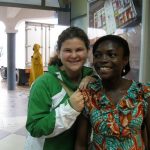Before coming to Ghana, I had a single story of Africa. In the U.S., popular images of Africa portray the continent as one place that is characterized by poverty and suffering. Many Americas fail to recognize that Africa is actually made up of 54 different countries. Big name celebrities and major media campaigns encourage Americans to help those suffering in Africa. We are not shown positives messages about Africa. We are only fed negative ones.
When I first heard about the study abroad program my university offered in Africa, I assumed it would involve helping people. I was wrong. The University of Oregon’s Media in Ghana program gives aspiring journalism students the opportunity to work at various media related internships in Ghana. We are not here to help people. We are simply here to work as media professionals alongside Ghanaians and to learn from them.
In order to prepare for our six weeks abroad, my classmates and I took a course that taught us about Ghana and its larger media context. Our weekly meetings included readings and oral reports that covered the political-economic and cultural history of Ghana, images of Africa in U.S. media, the impact of colonial and post-colonial influence of African media, and Ghana’s media history from indigenous forms to the Internet and the changing balance between state- and privately-owned media.
After learning about Ghana’s history and speaking with students who went to Ghana last year, my preconceived perception of Africa changed. I started to recognize and differentiate specific countries in Africa, and I stopped referring to Africa as a whole.
Although I was prepared, my first couple of weeks in Ghana were difficult. I had a hard time finding my way around Accra because taxi drivers and tro tros seldom go by exact street names or addresses, but rather by landmarks. However, with the help of friendly Ghanaians I have always managed to find my way, and once I mastered the tro tro, transportation became very easy. There are also many cultural differences that took some time to get used to, but that’s common when anyone travels to a new country. Living in Ghana forced me to adjust my diet, adapt to the heat and get used to the sporadic power outages. Although these changes were difficult in the beginning, I am finally comfortable in this new country.
Now that I am acclimated to daily life, I have learned to appreciate and absorb all that Ghana has to offer. My classmates and I have also traveled to Cape Coast and Kumasi, where we learned more about Ghana’s rich culture outside of Accra.
Living in Ghana for over three weeks so far has completely changed my single story view of Africa that I had constructed from the media and popular images of Africa in the U.S. The negative stories of Africa that I commonly heard in America caused me to overlook the multitude of other stories that form each country in Africa. I have now learned to focus on the positive and more nuanced stories, for it is these stories that help reveal the complexity of Ghana.



Comments by jaclynr